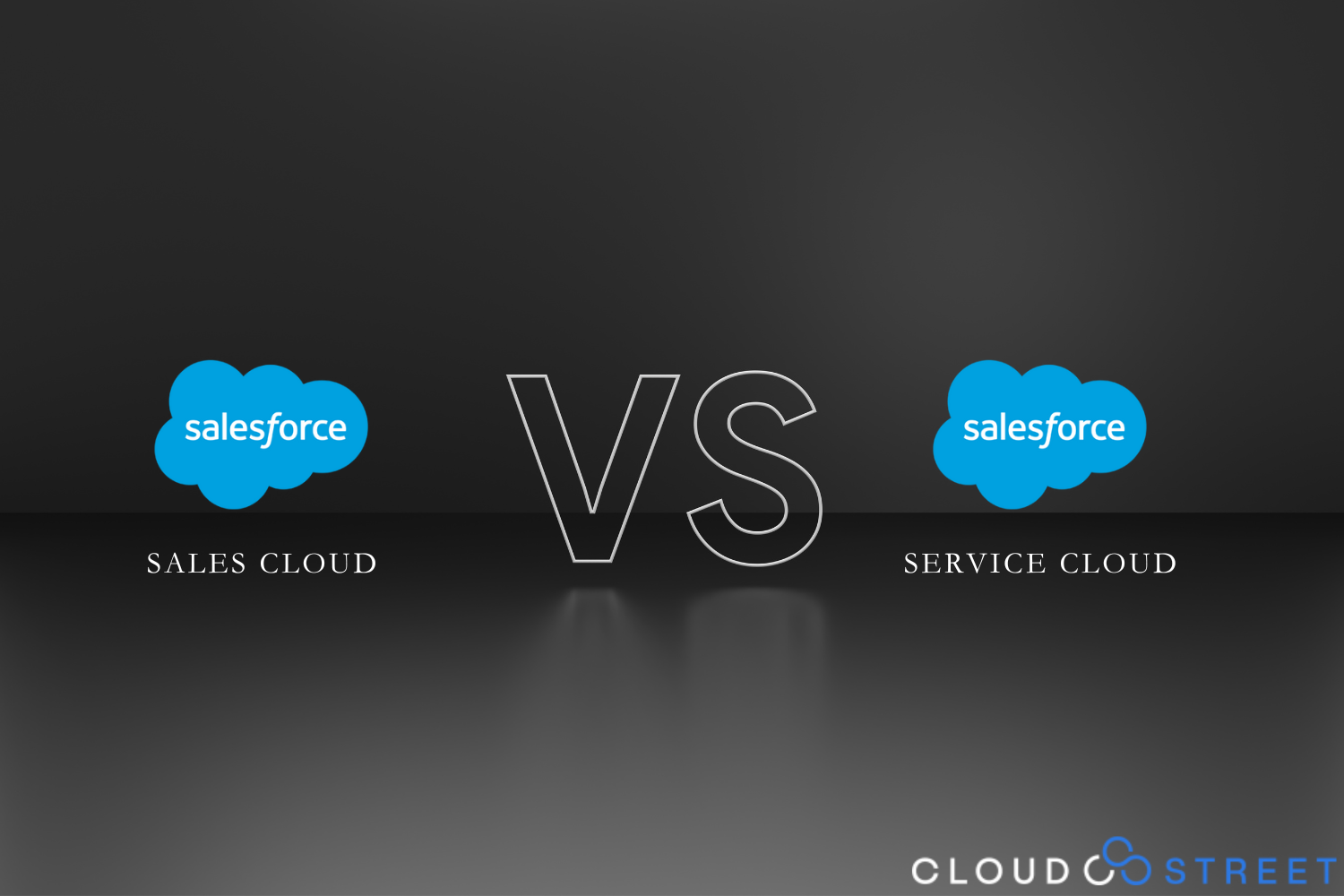Salesforce Sales Cloud vs Service Cloud: Which is Better for Your Needs?

Are you looking for a CRM that helps keep the business structured and thriving? A CRM platform can have a huge impact on your business’s success. One of the top CRM platforms, Salesforce, offers a range of customized clouds to meet various corporate requirements. When you’ve implemented Salesforce as your primary Customer Relationship Management software, your company will reap numerous benefits.
When comparing Sales Cloud vs. Service Cloud, it’s essential that you know what each service offers. Although there are numerous similarities between the two clouds, their intended uses are different from one another. Whether you’re looking for Salesforce Sales Cloud, Salesforce Service Cloud, or both is determined by your company’s specific requirements.
Salesforce Sales Cloud
Salesforce Sales Cloud has been developed to handle contacts, opportunities, and sales forecasts to enable interaction with current and future clients. With the help of this effective application, users may generate and monitor revenue throughout every step of the sales cycle and effectively manage their client relationships. Sales Cloud is mainly involved with CRM sales components, specifically how users maintain lead generation, contact information, accounting, finance, and prospects, compared to customer service.
The Sales Cloud makes sure you are always informed about the effectiveness of the salespeople working for you and the present state of purchase with customizable dashboards and real-time statistics. Additionally, Sales Cloud offers a state-of-the-art connection that lets you integrate into other practical business programs, such as e-commerce platforms, contract management platforms, and marketing automation tools.
Features of Salesforce Sales Cloud
Salesforce Sales Cloud offers your businesses a multitude of features. Some of them are as follows:
- Leads can be scored, routed, and converted. Discover insights that help you identify potential prospects.
- Monitors transactions until they are closed. Managing pipeline and forecasting revenue.
- Makes dashboards and reports to track both team and personal achievement toward objectives.
- Having access to contacts, profiles, and additional client data while on any device.
- Leverages a single CRM platform to manage projects, files, calendars, and conversations.
- Keeps up-to-date profiles that include activity records.
- Initiates actions and procedures to optimize sales procedures.
Benefits of Salesforce Sales Cloud
Salesforce sales cloud brought in around 6 billion dollars of revenue for Salesforce in 2023. This was because of its productivity and the multiple benefits it offers to its clients:
Efficient Communication Platform
Highly efficient communication and coordination among everyone on the team are needed to meet sales goals. Chatter is an integrated social network specifically designed for businesses, among the communication alternatives that Salesforce Sales Cloud provides. Sales representatives can work together on contracts, connect with one another, and get suggestions from peers via Chatter.
Enhanced Customer Relationship
With Salesforce Sales Cloud, your team can obtain the most insightful customer data to enhance comprehension and foster positive relationships with customers. Thus, it enables businesses to learn more about their consumer base in a more comprehensive and effective manner, resulting in long-term, loyal customers.
Real-time Dashboards
Sales Cloud provides you with real-time visibility into the performance and projections of your team. Using predictive analytics, businesses can always feel certain that their company is on the correct track and change their strategy based on relevant data. With an easy drag-and-drop interface, businesses are able to quickly generate one’s own customized reports with precise attributes while getting the most recent data.
Automating Operations
Salesforce Sales Cloud provides significant assistance; one of its most amazing features, “Macros,” enables businesses to streamline challenging operations in bulk. As a result, the sales team can focus more closely on engaging with clients in real-time, increasing productivity and reducing the time frame of the sales cycle. Sales Cloud may also help prioritize leads and deals.
Predictions with AI
Sales teams can more accurately forecast profits with the help of Salesforce Sales Cloud’s comprehensive forecasting features. These technologies provide insights into potential marketing success by using pipeline data, historical data, and adaptable forecasting models. Based on these projections, sales executives can better organize resources and modify their plans, which could enhance business results.
Remote Cloud Access
Salesforce Sales Cloud facilitates the segregation of essential customer and business data, enabling businesses to access it for informed decision-making. Sales representatives may simply engage with customers by extracting the data with just a few mouse clicks, and then they can access it remotely from anywhere in the world.
Salesforce Service Cloud
Salesforce Service Cloud makes it quick and easy to create one-on-one connections with every client over every channel and on any kind of device. An organization can increase customer satisfaction and organizational efficiency by streamlining all customer service contacts and leveraging self-help features with a service cloud.
Service Cloud provides customer care employees with the resources and expertise they need to respond to client inquiries and issues as efficiently as possible. It gives your support representative the ability to reply to messages received from social media, text messaging, phone calls, or email in a timely and efficient manner. Additionally, you are able to stay at the forefront of the competition by using machine learning and artificial intelligence (AI) with the Service Cloud.
Features of Salesforce Service Cloud
Salesforce Service Cloud brings about a wide variety of features for both your business and customer making. Here are some of the features that it offers:
- Monitor, regulate, and address complaints with customer service.
- Route cases and initiate automated responses according to pre-established rules.
- Easily locate solutions using an integrated knowledge center.
- Dashboards and reporting can be used to keep an eye on SLAs and productivity.
- Plan and coordinate the scheduling of field service specialist visits.
- Provide clients with one platform for email, phone, chat rooms, networking sites, and more assistance.
- Desktop agent designed with client needs and productivity in mind.
- Deflect cases by creating consumer communities and platforms.
Benefits of Salesforce Service Cloud
Salesforce service cloud brought in around 7 billion dollars of revenue for Salesforce in 2023. It is because of its versatility that it offers along with its multiple benefits such as the following:
Accessibility to Data
Salesforce Service Cloud Solution is the most efficient and simplest method for keeping track of vital data and putting it in a central spot for easier access. Service Cloud makes sure that having access to client data is simple for numerous divisions by offering services like knowledge centers, case handling, backlog management, and connectivity with previous platforms.
Customized Customer Experience
Numerous options are available in Salesforce to enhance client interactions. The latest technology enables customer support representatives to connect with their customers instantly and in real-time, giving any required data whenever necessary. Since each customer is different and requires individualized attention, sales representatives must keep track of every relevant detail about their clients in order to provide them with a personalized experience and increase conversion rates. In order to provide a more tailored and enhanced client experience, Service Cloud streamlines and effectively succeeds in these roles.
Team Collaborations
Salesforce Service Cloud facilitates intelligent teamwork by enabling employees to connect and share insights, guidance, and informative experiences. Agents and employees with more expertise and work experience can guide fresher team members. Furthermore, documents can be shared via the Service Cloud, enabling agents to discuss topics and collaborate to find solutions.
Reduced Work Loads
Salesforce Service Cloud’s Omni Routing tool helps to streamline workflow procedures. This speeds up solutions and cuts down on resolution periods by making sure that the most competent representatives are designated to the issue at hand. Team productivity is further increased by taking proactive steps to identify and train highly effective representatives on the basis of empirical data.
Cloud Benefits
Your team can log in from any place at any given moment with the Salesforce Service Cloud, which frees them from location-based constraints. With apps like the Salesforce1 Mobile App, remote team members are guaranteed that they will have the data necessary for providing customer assistance while on the move. The amalgamation of cloud computing and smart apps guarantees that no customer service request becomes too hard, regardless of whether you’re disconnected from your workstation.
Self-Service Functionalities for Customers
For clients, having the opportunity to assist themselves is a major advantage. In the end, buyers and customers have the ability to get in touch with your company to inquire about solutions and subsequently execute them at their own convenience. The platform also features customer communities where users may interact and talk about solutions that suit their needs.
Salesforce Sales Cloud vs. Service Cloud: Comparison
Here is a defined comparison between Salesforce Sales Cloud and Service Cloud.
| Salesforce Sales Cloud | Salesforce Service Cloud |
| Sales Cloud improves an organization’s sales process and keeps track of all the relevant parties, including leads, relationships, user accounts, clients, offers, and so on. | Service Cloud helps companies optimize and streamline their customer service and support operations. Accounts, contacts, cases, customer service centers, public databases, etc., constitute essential components. |
| Sales Cloud uses lead management and accounts & contact management for managing potential customers and customer-related data. | Service Cloud provides a thorough picture of client and account information, every case that has been raised, its history, and its current state. |
| Its primary goal is to provide direction to the sales team so they may better nurture leads and increase sales. | Its main goal is to comply with what the customer wants and deliver the necessary services effectively and efficiently. |
| Measurable objectives that can be used to calculate the quantity of leads converted or products sold. | There are no set quantitative objectives because it is difficult to quantify how satisfied customers are. |
| Salesforce Sales Cloud is developed primarily for the sales team, which includes sales executives and sales representatives. | Salesforce Service Cloud is created for the Service and Support team, which consists of customer service executives, service agents, and support members. |
Optimize Your Salesforce Implementation with Cloudstreet
As you learn more about Salesforce for your company, you’ll understand that the Sales and Service clouds are both based on a single-core Salesforce Platform. They are similar to sibling relationships given that they share functionality like Accounts and Contacts, as well as primitive Case management. The primary focus of Salesforce Sales Cloud is on sales process management, whereas Salesforce Service Cloud is primarily designed for customer service and support management.
It is possible to integrate both products to offer a customer-focused experience across the whole customer journey.
The choice between them is determined by whether you place a higher importance on sales growth or customer service. Before choosing, take expenses, integration, and customization into account. Engaging in consultation with Cloudstreet and our Salesforce professionals ensures a customized solution and a seamless transfer to the appropriate Salesforce platform.
Common Questions About Salesforce Sales Cloud vs. Service Cloud
Q1. Why choose Salesforce Service Cloud?
Salesforce Service Cloud enables you to provide your clients with effective and tailored assistance across a variety of platforms. Your team will have a comprehensive understanding of every customer’s history and individual needs if you unify all of your customer interactions into a single platform.
Q2. Is Salesforce a PaaS or SaaS?
Salesforce’s hybrid strategy for providing both SaaS and PaaS solutions empowers enterprises with the versatility and adaptability essential for growth and evolution in today’s dynamic business setting.
Q3. What is Salesforce CPQ?
Salesforce CPQ refers to Configure, Price, and Quote. It’s a tool for optimizing sales while putting together complex products and generating quotations for clients. The CPQ software provides quotations effortlessly and allows the sales team to access them instantly based on the needs of the customer.
Q4. How many Salesforce clouds are there?
Salesforce provides more than 15 cloud service options, such as Sales, Service, Marketing, Commerce, Analytics, Community, and more. Every cloud serves a variety of organizational objectives and consumer demands.
Q5. What is the difference between the Salesforce Sales Cloud and Marketing Cloud?
While Salesforce Sales Cloud is designed to close sales and generate income, Salesforce Marketing Cloud has been developed to find prospects and steer them closer to your business’s goods or services.
Discover insights that drive results - explore out latest blog posts now
Unlocking B2B Success with Salesforce Experience Cloud
Unlocking B2B Success with Salesforce Experience Cloud In today’s [...]
Future-Ready: How AI is Shaping the Mid-Market Manufacturing Landscape
Future-Ready: How AI is Shaping the Mid-Market Manufacturing Landscape [...]
Drowning in Data? Get Expert Data Entry Help for Only $9/Hour!
Data overload slowing you down? Spending too much valuable [...]


